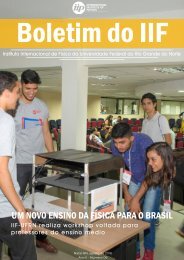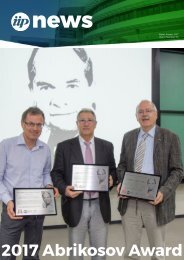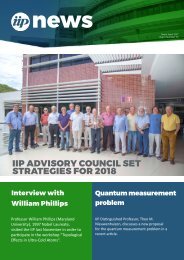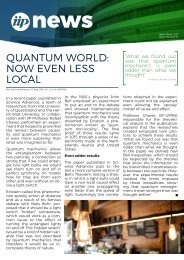IIP News
The IIP is a research institute with an international vocation, permanently facing the frontier areas of theoretical physics. Its mission is to intensify the exchange of scientific knowledge with the international community and, in particular with the Latin American community, being a pole unifying national strategic areas of theoretical physics.
The IIP is a research institute with an international vocation, permanently facing the frontier areas of theoretical physics. Its mission is to intensify the exchange of scientific knowledge with the international community and, in particular with the Latin American community, being a pole unifying national strategic areas of theoretical physics.
Create successful ePaper yourself
Turn your PDF publications into a flip-book with our unique Google optimized e-Paper software.
news<br />
INTERNATIONAL<br />
INSTITUTE OF<br />
PHYSICS<br />
Natal,<br />
June, 2016<br />
Year I Number 01<br />
Photo by Wallacy Medeiros<br />
Local authorities and <strong>IIP</strong> guests during the Institute official inauguration<br />
<strong>IIP</strong> inaugurates new building inside campus<br />
After three years of work<br />
the new building of the<br />
International Institute of<br />
Physics of the Federal University<br />
of Rio Grande do<br />
Norte (<strong>IIP</strong>-UFRN) was inaugurated<br />
last March 21 in a<br />
special ceremony, attended<br />
by local authorities and<br />
members of the Brazilian<br />
and international scientific<br />
community. The new<br />
building will provide de<br />
<strong>IIP</strong> with a better infrastructure<br />
and allow the institution<br />
to host its own events<br />
inside its facilities.<br />
“This new space will allow<br />
us to host an even bigger<br />
number of scientific events<br />
for a longer period of time<br />
and bring more scientists<br />
to work in Natal. This facility<br />
is unlike any other that<br />
I have ever seen in Brazil”,<br />
said the <strong>IIP</strong> Director, Professor<br />
Alvaro Ferraz.<br />
The construction started in<br />
2013 and covers over 4.000<br />
square meters. The building<br />
has an auditorium with<br />
148 seats, two seminar<br />
rooms, three discussion<br />
rooms, a high processing<br />
data laboratory, and more<br />
comfortable offices for researchers.<br />
Inauguration<br />
During the opening ceremony<br />
a crowded auditorium<br />
had the opportunity<br />
to watch a special presentation<br />
by the string quartet<br />
group “Café Quarteto”,<br />
from the University´s Music<br />
Department.<br />
The Rector Angela Paiva<br />
reinforced the commitment<br />
of UFRN with the <strong>IIP</strong>,<br />
and her personal pleasure<br />
to see the building concluded.<br />
According to Professor Paiva,<br />
the open interchange<br />
of renowned scientists in<br />
the university, enabled by<br />
the institute, and the high<br />
quality of the work presented<br />
by its researchers<br />
are just some of the benefits<br />
brought to the local<br />
scientific community by<br />
the <strong>IIP</strong> activities.<br />
Representing the post<br />
doctor researchers, Dr. Fabio<br />
Novaes addressed the<br />
present guests, and spoke<br />
about his career as a physicist<br />
and his experience as<br />
post-doctor at the <strong>IIP</strong>.<br />
The <strong>IIP</strong> goes further in the<br />
objective of forming new<br />
researchers. They put us<br />
in contact with some of<br />
the main research leaders<br />
of the world, who are<br />
happy to start new collaborations<br />
with us. I consider<br />
myself very lucky<br />
for having this kind of<br />
international experience<br />
inside my own country”,<br />
said Novaes.<br />
From left to right: The new <strong>IIP</strong> building inside the UFRN Campus; Rector Angela Ferraz with Professors Sergio Rezende and Ivonildo Rego; Prof. Ferraz during his speach in the <strong>IIP</strong> inauguration
2<br />
<strong>IIP</strong> <strong>News</strong> - Year I, number 01<br />
Workshop Physics and Mathematics of Complex Systems<br />
Physicists and Mathematicians<br />
were gathered<br />
at the <strong>IIP</strong> for two<br />
weeks, in a series of presentations<br />
and debates<br />
regarding challenges<br />
common to both sciences.<br />
The workshop “Physics<br />
and Mathematics<br />
of Complex Systems:<br />
Growing Interfaces,<br />
Nonlinear Dynamics,<br />
Integrability”, hosted<br />
from April 04 to 15, was<br />
the first major scientific<br />
event to take place<br />
at the new <strong>IIP</strong> building,<br />
and was organized<br />
to promote a unique<br />
synergy of expertise in<br />
physics, as well as in applied<br />
and pure mathematics,<br />
in order to tackle<br />
important theoretical<br />
challenges in non-equilibrium.<br />
According to Professor<br />
Boris Dubrovin, from<br />
SISSA, the event was a<br />
special opportunity to<br />
exchange experiences<br />
with colleagues from a<br />
different science.<br />
“I enjoyed very much<br />
this conference. It<br />
was mainly centered<br />
in physics. I am not a<br />
physicist, I am a Mathematician,<br />
nevertheless<br />
2016 IAC Meeting<br />
I am very interested<br />
in looking into what<br />
physicists do and in<br />
collaborating with<br />
them”, said Professor<br />
Dubrovin.<br />
The local scientific<br />
community, as well as<br />
representatives from<br />
other institutions in<br />
Brazil, were also present<br />
to the event, when<br />
they had the opportunity<br />
to interact with<br />
senior researchers.<br />
Photo by Waldelino Duarte<br />
IAC members during the first day of meeting<br />
The <strong>IIP</strong>’s International<br />
Advisory Council (IAC)<br />
was reconvened from<br />
March 21 to 22, in order<br />
to discuss the directives to<br />
be taken by the Institute in<br />
its 2017 calendar, as well<br />
as to analyze the results<br />
achieved in the scientific<br />
events of 2015. The IAC<br />
meeting is hosted once<br />
a year by the <strong>IIP</strong>, and is<br />
composed by renowned<br />
physicists from Brazil and<br />
abroad.<br />
As one of the results from<br />
this year meeting , a set<br />
of events has already<br />
been pre-approved for<br />
next year, including<br />
schools, workshops, and<br />
symposiums on theoretical<br />
physics and related areas.<br />
The event was hosted<br />
during the Inauguration<br />
of the new <strong>IIP</strong> building,<br />
so the counselors could<br />
be present during the<br />
ceremony that delivered<br />
the new installations.<br />
“This year’s meeting was<br />
very special for us, as it<br />
was the first time that our<br />
council was assembled<br />
in our own building. We<br />
worked very hard to<br />
be here today and the<br />
contribution of each IAC<br />
member was essential<br />
for this to happen”, said<br />
Professor Alvaro Ferraz, <strong>IIP</strong><br />
Director.
June, 2016 3<br />
Interview with<br />
Prof. Rodrigo Pereira<br />
Born in Sete Lagoas, Brazil, Rodrigo Pereira had an interest in science since<br />
elementary school and in high school decided to pursue a career in Physics<br />
because of the influence of one of his teachers. After his PhD and spending<br />
sometime in renowned scientific institutions in Brazil and abroad, he is now a full<br />
Professor at the <strong>IIP</strong> where he will work with Strong Correlated Electron Systems.<br />
In this interview he talks a little more about his work and expectations for the<br />
future of his research in Natal.<br />
ProfessorRodrigo Pereira in his office at the <strong>IIP</strong><br />
<strong>IIP</strong> NEWS - Tell us a little bit about<br />
your career in physics.<br />
PROF. RODRIGO PEREIRA - I did my<br />
undergrad and my masters at UNI-<br />
CAMP, and after that, in 2004 I went<br />
to Canada. I did my PhD at the University<br />
of Britsh Columbia, working<br />
with Professor Ian Affleck, and after<br />
that I did a post-doc at the Kavli Institute<br />
for Theoretical Physics (USA)<br />
for two years.<br />
Since 2010 I’ve been back in Brazil,<br />
working in São Carlos, at the University<br />
of São Paulo and today I’m here<br />
for my first day at the <strong>IIP</strong>.<br />
I have always worked in condensed<br />
matter physics, strongly correlated<br />
systems, so I’m mainly interested in<br />
applications of field theory matters<br />
to strongly correlated systems. I do<br />
a lot of work on one dimensional<br />
systems, using techniques like bosonisation,<br />
conformal field theories,<br />
sometimes exact methods for integrable<br />
models, but I am also interested<br />
in understanding what one<br />
can measure in an experiment, so at<br />
the same time I try to explain some<br />
physical properties in materials.<br />
<strong>IIP</strong> NEW - When did you first develop<br />
an interest in science?<br />
Photo by Cyro Lucas Souza<br />
PROF. RODRIGO PEREIRA - I guess<br />
that it was in elementary school. I<br />
was always a bit curious about science,<br />
I was always reading a lot and<br />
trying to understand things, but it<br />
was really in high school that I decided<br />
that I wanted to study physics.<br />
I was very much influenced by a very<br />
good physics teacher that I had. He<br />
started telling me some stuff beyond<br />
what we were learning in school, so I<br />
thought that was interesting.<br />
Since I lived in a small town I had no<br />
idea of what a physicist did at the<br />
time, but I was very interested so I<br />
had decided that I wanted to study<br />
physics.<br />
<strong>IIP</strong> NEWS - And when did you decide<br />
to pursue a career as a researcher?<br />
PROF. RODRIGO PEREIRA - I guess<br />
I tried to give my small contribution<br />
to this bigger enterprise of human<br />
knowledge and how we try to understand<br />
the world around us and<br />
for me the most interesting things<br />
are those in physics, like to understand<br />
things in the very fundamental<br />
level.<br />
What happens in the level of elementary<br />
parts, how they interact,<br />
and this gives life to the things we<br />
see. This is basically what we are doing<br />
in condensed matter physics.<br />
Put a lot of small things together, let<br />
them interact and out comes all the<br />
properties of materials around us in<br />
all many different colors and flavors,<br />
and I like to make this connection<br />
from very simple fundamental walls<br />
to all this diversity of things that we<br />
see.<br />
<strong>IIP</strong> NEWS - How was your first contact<br />
with the <strong>IIP</strong>?<br />
PROF. RODRIGO PEREIRA - That<br />
was shortly after I moved back to<br />
Brazil. I was in São Carlos and together<br />
with Professors Francisco Alcaraz<br />
and José Hoyos, we said that we<br />
wanted to organize a winter school<br />
in statistical physics. At first we<br />
thought about doing it in São Carlos,<br />
but then we learned about the<br />
<strong>IIP</strong> and how they were organizing so<br />
many events, so I liked the idea. So,<br />
the first time I came here was as an<br />
organizer, and for me it was an interesting<br />
experience as well, because I<br />
was organizing a school that I had<br />
participated before as a student, in a<br />
previous edition in São Carlos.<br />
<strong>IIP</strong> NEWS - What are you working on<br />
right now?<br />
PROF. RODRIGO PEREIRA - These<br />
days I’ve been mainly thinking about<br />
cold atoms systems. So one of the<br />
things I do is something call quantum<br />
impurity models. What happens<br />
when you have some kind of<br />
system that can be even non interactive,<br />
but you add a different atom<br />
or something that is gonna move in<br />
the system and interact with everything<br />
else, and ask about how that<br />
changes the properties of the system<br />
locally or of this object that is<br />
moving around? So at the moment<br />
I am working on a problem of impurity<br />
in a two dimensional fermy gas,<br />
that has some special kind of interaction<br />
that completely chances all<br />
the properties of the particle that<br />
is moving in that system, and that<br />
uses field theory matters, because<br />
it can show that this kind of interaction<br />
is renormalizable and it moves<br />
to different low energy properties<br />
depending on the fractures on the<br />
model, and I try to understand what<br />
the different possibilities are.<br />
<strong>IIP</strong> NEWS - What advice would you<br />
give to the students that are joining<br />
the physics course today and want<br />
to join the research career?<br />
PROF. RODRIGO PEREIRA - I would<br />
say go for it. It is worth it. From the<br />
beginning it looks very hard, because<br />
you have to work very hard<br />
and study a lot, and the prospect<br />
of becoming a professor seems so<br />
far away. For me it was like that.<br />
But I really believe that if you work<br />
hard enough the opportunities will<br />
come. You have a lot of chances to<br />
interact with people with similar<br />
interests, meet people from many<br />
different countries, so it’s a very nice<br />
profession and I would recommend<br />
it to everybody who is really excited<br />
about doing research.
4<br />
<strong>IIP</strong>-UFRN hosts special event to celebrate the<br />
Physicist Day in Brazil<br />
<strong>IIP</strong> <strong>News</strong> - Year I, number 01<br />
The <strong>IIP</strong> and the Department of Theoretical and<br />
Experimental Physics (DFTE-UFRN) held a joint event<br />
last May 19, to celebrate the Brazilian Physicist Day.<br />
During this special activity, the <strong>IIP</strong> auditorium was<br />
crowded with students, Professors and researchers<br />
from the local scientific community, who participated<br />
in a series of presentations of the university’s research<br />
groups in physics.<br />
Many grad-students were present and could learn<br />
more about the research fields of the <strong>IIP</strong> and DFTE, as<br />
well as know more about the researchers and visiting<br />
researchers developing their work at the university.<br />
“I liked a lot. It was very interesting to know about the<br />
subjects that the researchers from DFTE and the <strong>IIP</strong> are<br />
studying”, said Herman Bueno, a 7º semester physics<br />
grad student from UFRN.<br />
According to <strong>IIP</strong> Professor Dmitry Melnikov, this was<br />
also an opportunity for physicists from <strong>IIP</strong> and the DFTE<br />
to learn more about the research in progress in the<br />
many groups of both centers.<br />
“I was very happy to see so many participants in this<br />
event, specially the grad-students, who could learn<br />
more about the research lines being studied at the<br />
University. It was very nice to me too, since I got to<br />
know more about my colleagues research here at the<br />
University”, said Professor Melnikov.<br />
More than 100 members of the local scientific<br />
community participated in the 13 lectures offered<br />
during the event, which the organizers hope to<br />
transform into an annual activity.<br />
Professor Carlos Chesmann (DFTE) talks about the use of liquid nitrogen<br />
UFRN students during the Physicist Day Celebration at <strong>IIP</strong><br />
“Kerr Scattering coefficient via isomonodromy”<br />
Work developed by researchers Fabio Novaes (<strong>IIP</strong>-UFRN) e Bruno Carneiro Cunha (UFPE)<br />
In a paper recently published in the Journal of High<br />
Energy Physics, <strong>IIP</strong> researcher Dr. Fabio Novaes<br />
and Prof. Bruno Carneiro da Cunha from UFPE,<br />
presented a new method to calculate scattering<br />
coefficients of scalar waves propagating around<br />
arotating black hole, the so-called Kerr black hole.<br />
Scalar wave scattering is usually studied through<br />
the Klein-Gordon equation, in a curved background,<br />
to model the behavior of waves when<br />
launched into a black hole. This method analyzes<br />
the waves reflected and transmitted during this<br />
process. The essential quantity calculated is the<br />
scattering coefficient.<br />
Novaes and Carneiro Cunha proposed a way to<br />
express scattering data using the monodromy of<br />
solutions of Klein-Gordon equation, inspired by<br />
previous work of Castro et al. in Class.Quant.Grav.<br />
30 (2013) 165005. The crucial quantity in the expression<br />
is the composite monodromy, which can<br />
be calculated via their novel application of the isomonodromy<br />
deformation of these equations. This<br />
work explores the relationship of isomonodromic<br />
deformations and Painlevé VI τ-function, recently<br />
developed in detail by O. Gamayun, N. Iorgov and<br />
O. Lisovyy in JHEP 1210 (2012) 038 and first discovered<br />
by Japanese mathematicians Jimbo, Miwa<br />
and Ueno in the 1980’s.<br />
Dr. Fábio Novaes now works in new applications<br />
of the method in gravitational waves and in the<br />
relationship between Gravity and Conformal Field<br />
Theory (CFT).
Next Schools & Workshops<br />
June, 2016 5<br />
Events to Come<br />
School and Workshop Strings at Dunes<br />
July 04 to 15<br />
Workshop Fermi-Surface Topology and Emergence<br />
of Novel Electronic States in Strongly Correlated<br />
Systems<br />
July 18 to August 01<br />
Workshop Interference of Magnetism and<br />
Superconductivity<br />
July 18 to September 02<br />
Workshop New Trends in Integrable Models<br />
August 15 to November 25<br />
Workshop Boundary Degrees of Freedom and<br />
Thermodynamics of Integrable Models<br />
August 22 to September 02<br />
International School on Laser-Beam Interactions<br />
(Brazil, France, Italy)<br />
September 08 to 12<br />
Workshop Thermal and Electronic Transport in<br />
Nanostructures<br />
October 31 to November 11<br />
Workshop Topological Effects in Ultra-Cold Atoms<br />
November 14 to 18<br />
Latest publications<br />
Role of The Pion Electromagnetic Form Factor in The Δð1232þ → Γn Timelike Transition. G. Ramalho; M.T. Peña; J. Weil;<br />
H. Van Hees; U. Mosel. Phys. Rev. D - 93, February 11, (2016);<br />
Characterizing the Local Solvation Environment of OH− In Water Clusters With AIMD. Yanier Crespo; Ali Hassanali. J.<br />
CHEM. PHYS. 144, 074304 (2016);<br />
Nonequilibrium critical scaling in quantum thermodynamics. Abolfazl Bayat, Tony J. G. Apollaro, Simone Paganelli,<br />
Gabriele De Chiara, Henrik Johannesson, Sougato Bose, Pasquale Sodano.Phys. Rev. B 93, 201106(R) (2016);<br />
Entanglement structure of the two-channel Kondo model. Bedoor Alkurtass, Abolfazl Bayat, Ian Affleck, Sougato Bose,<br />
Henrik Johannesson, Pasquale Sodano, Erik S. Sørensen, Karyn Le Hur. Phys. Rev. B 93, 081106(R) (2016);<br />
On skew tau-functions in higher spin theory. Melnikov, D.; Mironov, A.; Morozov, A. J High Energy Phys, v. 2016, p. 27, (2016);<br />
Magnetic order of Y3NiSi3-type R3NiSi3 (R=Gd–DY) compounds. A.V. Morozkin, V.O. Yapaskurt, R. Nirmala, S.K. Malik,<br />
S. Quezado, Jinlei Yao, Y. Mozharivskyj, A.K. Nigam, O. Isnard.Journal of Magnetism and Magnetic Materials Volume<br />
398, (2016);<br />
Kerr-de Sitter greybody factors via isomonodromy. Bruno Carneiro da Cunha, Fábio Novaes. Phys. Rev. D 93, 024045 (2016);<br />
Dirac neutrino mass from a neutrino dark matter model for the galaxy cluster Abell 1689. Theodorus M. Nieuwenhuizen.J.<br />
Phys.: Conf. Ser. - 7011 (2016).<br />
Contact us at press@iip.ufrn.br to receive news about our seminars and colloquia in your email.
6<br />
<strong>IIP</strong> <strong>News</strong> - Year I, number 01<br />
<strong>IIP</strong> Photo Galery<br />
New Building<br />
Inauguration<br />
<strong>IIP</strong> Auditorium<br />
The group “Café Quartet” performs at the<br />
Inauguration<br />
Rector Angela Paiva<br />
Dr. Fabio Novaes<br />
Guests from the scientific community<br />
<strong>IIP</strong> Staff<br />
<strong>IIP</strong> guests during the cocktail party<br />
Professor Alvaro Ferraz<br />
INTERNATIONAL<br />
INSTITUTE OF<br />
PHYSICS<br />
Visit our website to know more about our programs and events:<br />
www.iip.ufrn<br />
To see the guidelines for scientific proposals at the <strong>IIP</strong> visit:<br />
www.iip.ufrn.br/proposalsforeventsdetail<br />
Follow the <strong>IIP</strong> activities in our Facebook page:<br />
www.facebook.com/iipufrn<br />
Subscribe to our Youtube chanel:<br />
www.youtube.com/iiptv<br />
<strong>News</strong>letter produced by the <strong>IIP</strong> Communication Office.<br />
Contact us at +55 (84) 3342-2249 (ext. 208) / press@iip.ufrn.br.







